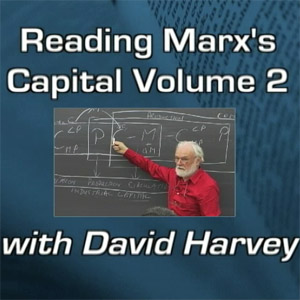

Reading Marx's Capital Volume 2 (audio)
David Harvey
A close reading of the text of Karl Marx's Capital Volume 2 (plus parts of Volume 3) in 12 lectures by Professor David Harvey.
Episodes
Mentioned books

Aug 8, 2013 • 1h 40min
Class 12 - Reprise
Professor David Harvey discusses Marx's Capital Volume 2, highlighting class reproduction, consumption contrasts, autonomy in the economy, and crisis generation. The discussion delves into historical context, Parisian societal changes, Marxism and liberation theology, capitalism's crisis proneness, and the influence of working-class interests on the capitalist state.

4 snips
Jun 5, 2013 • 1h 40min
Class 11 - Vol 2, Chapters 20-21
Professor David Harvey discusses Marx's Capital Volume 2, exploring topics such as the credit system's role in capitalism, planning structures in regional economies, the relationship between production departments in socialist planning, and the critique of human capital theory as a commodity benefiting capitalists.

Apr 1, 2013 • 1h 54min
Class 10 - Vol 2, Chapters 18-20
Professor David Harvey discusses Marx's view of capital's treatment of nature, contrasting approaches to interpreting Marx's schemas, historical economic thought, Pierre Schraffer's critique of neoclassical economics, analogies between blood flow and capital circulation, and Marx's analysis of economic growth.

Feb 22, 2013 • 1h 51min
Class 09 - Vol 2, Chapters 15-17
Professor David Harvey discusses the significance of workers in the economic cycle, the impact of circulation time on advanced capital, analysis of prices, production, and surplus value circulation in capitalist society, and capitalist accumulation and investment in the system.

Feb 12, 2013 • 1h 42min
Class 08 - Vol 2, Chapters 12-14
Professor David Harvey discusses the complexities of capital investment, fixed capital formation, and fictitious capital. Topics include the impact of technological advancements on continuous use of fixed capital, the risks associated with fictitious capital, and the evolution of derivatives and credit markets. The conversation also covers profit, interest, and capital accumulation, as well as the circulation of capital in global markets.

5 snips
Sep 18, 2012 • 1h 51min
Class 07 - Vol 3, Chapters 36, 27-32
Professor David Harvey discusses the dynamics of wealth mobility, role of credit, and banking systems in capitalist societies. The podcast also delves into the risks of financial institutions, evolution of usury, and transformation of enterprises and capital ownership. Additionally, it explores Marx's views on the abolition of the capitalist mode of production and the role of the credit system in transitioning towards socialism.

5 snips
Jul 9, 2012 • 2h 1min
Class 06 - Vol 3, Chapters 21-26
Professor David Harvey discusses the dynamics between money capitalists and industrial capitalists, the crisis of 1847-48 compared to modern financial crises, the concept of interest-bearing capital and justice in a capitalistic mode of production, the complexities of interest-bearing capital in capitalist economies, and the irrationality and fetishism in economics.

4 snips
May 17, 2012 • 1h 45min
Class 05 - Vol 3, Chapters 16-20
Professor David Harvey discusses the evolution of merchant capital, exploring how it transformed into modern corporations like Walmart. He delves into producer-merchant dynamics using examples from General Motors and Walmart, setting the stage for a deep dive into Volume 3 of Capital. The discussion highlights the challenges in understanding Marx's work, proposing a methodical approach. The podcast also explores labor exploitation in global trade and the crucial role of merchant capitalists in profit circulation.

4 snips
Apr 16, 2012 • 1h 43min
Class 04 - Vol 2, Chapters 7-11
Professor David Harvey discusses Marx's analysis of fixed and circulating capital, urbanization's impact, and the role of machinery in production under capitalism. The podcast also explores Rostow's economic growth stages, Marx's critique of capitalist economists, moral depreciation's challenges, and the state's role in infrastructure investments.

14 snips
Feb 17, 2012 • 1h 51min
Class 03 - Vol 2, Chapters 4-6
Professor David Harvey discusses the intricate social dynamics of capital and labor, disruptions in capital circuits, the interplay of capitalism, slavery, and surplus value in history, essence of capital-labor relations, complexities of global trade dynamics, maximizing surplus value through efficiency, historical evolution of beer brewing, and the impact of transport and communication innovations on globalization.


